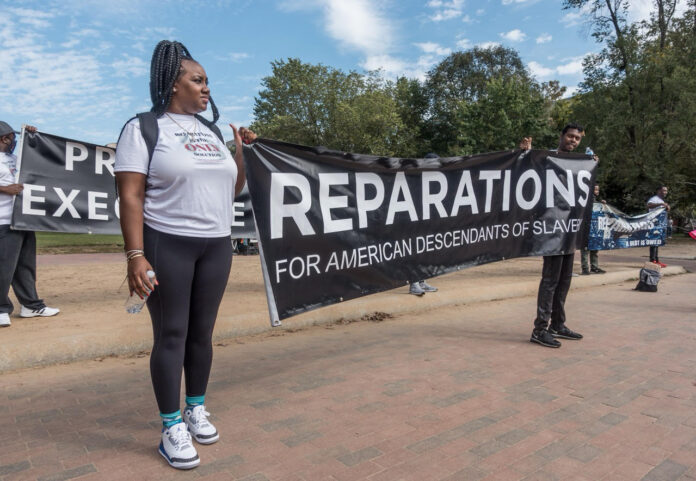
By Joe W. Bowers Jr., California Black Media
In a move supporting vulnerable communities, the 2024 California budget agreement has earmarked $103 million in one-time funding for victims’ services programs. This allocation is designed to compensate for federal funding cuts and ensure continued support for crime victims across the state.
Grace Glaser of VALOR, a member of the California VOCA Advocacy Alliance, a statewide coalition of organizations dedicated to supporting survivors of crime, advocates, and their communities, praised this move, stating, “Gov. Newsom and the legislature have temporarily stitched [the safety net] back together with their commitment to one-time backfill funding, ensuring that for now, victims will receive support during the most traumatic and dangerous times of their lives.”
While grateful for the current funding, Glaser emphasized the need for ongoing financial commitment to ensure long-term stability for victims’ services in California. She said, “Our coalition will be back next year, urging Gov. Newsom and the Legislature to prioritize the needs of survivors of crime on an ongoing basis.”
The budget also allocates $12 million to support the implementation of reparations legislation enacted into law this session. This funding aims to help address historical injustices and promote equity and justice for Black Californians.
Assemblymember Lori Wilson (D-Suisun City), California Legislative Black Caucus (CLBC) Chair, told California Black
Media: “I consider the governor’s allocation of $12 million for reparations resources a win. While the Legislative Black Caucus is committed to getting our legislative work on Reparations fully funded, I believe this is a positive start, especially during a challenging budget year. As I’ve always emphasized, this is a multi-year effort to implement the legislative recommendations in the report.”
The 2024 CLBC Reparation Priority Bill Package includes 14 measures being considered by the Assembly and Senate. Additionally, CLBC vice chair Sen Steven Bradford (D-Inglewood) has proposed two reparations-focused bills not included in the package, also under review by the legislature. The deadline for each house to pass these bills is Aug. 31.
Bradford expressed gratitude for the allocation of $12 million in the state budget for reparations, despite the state’s current financial challenges.
“This money will start to stand up the infrastructure to pay for future reparations. We, as the California Legislative Black Caucus, made the case that the harms of slavery and racist public policies aren’t healed,” Bradford said. “This clearly states that reparations do matter and will be a priority in California going forward. This is just the beginning.”
The 2024 Budget agreement reached between Newsom, Senate President pro Tempore Mike McGuire (D-North Coast), and Assembly Speaker Robert Rivas (D-Salinas) comes at a time when the state faces significant fiscal challenges.
In his statement announcing the agreement, Newsom highlighted the budget’s role in establishing “long-term fiscal stability,” addressing both the immediate shortfall and strengthening resilience for the future. He noted the commitment to preserving programs that support millions of Californians, including “key funding for education, health care, expanded behavioral health services, and combating homelessness.”
McGuire acknowledged that despite the difficult budget year, the situation was not as dire as initially feared. He pointed out that the budget addresses tough policy challenges by allocating resources to combat homelessness, investing in housing, and funding efforts to fight wildfires and retail theft. He also mentioned that the agreement ensures record funding for public schools, supports vulnerable communities, and addresses the climate crisis while maintaining responsible reserves.
Rivas’ statement focused on the Assembly’s efforts to protect vital public services and ensure long-term stability. He stated that the budget “prioritizes affordability and long-term stability,” securing investments to lower housing costs and sustain essential programs for vulnerable families. He emphasized the importance of balancing the budget while preserving a significant portion of the Rainy Day Fund to prepare for future challenges. “Accountability was a cornerstone of this journey, which included 72 Assembly budget hearings and hundreds of hours of public feedback,” he said.
The budget plan includes $297.9 billion in total expenditures, with $211.5 billion from the General Fund. It preserves significant reserves, with the Budget Stabilization Account projected to hold $22.2 billion at the end of the 2024-25 fiscal year.
The agreement addresses a $46.8 billion deficit through a combination of reductions, revenue increases, and fund shifts. About $16 billion in cuts come from state operations and various programs, including a nearly 8% reduction in state operations, saving $2.17 billion, and a $1.5 billion cut through the elimination of unfilled positions. The California Department of Corrections and Rehabilitation will see a $750 million cut over three years, with an ongoing annual reduction of about $560 million, including the deactivation of 46 housing units across 13 prisons.
The budget also includes $13.6 billion in revenue/internal borrowing, $6 billion each in reserves withdrawals and fund shifts, $3.1 billion in expenditure delays and pauses, and $2.1 billion in payment deferrals. Revenue increases are achieved through suspending net operating loss deductions and increasing the Managed Care Organization tax.
With an expenditure of $136 billion projected for TK-12 and a per-student allocation exceeding $24,000, the budget safeguards classroom funding with constitutional protection against any revenue fluctuations the state may experience. Higher education will also see a 5% increase in base funding for the University of California and California State University systems to support enrollment growth.
The budget maintains core programs like Medi-Cal, behavioral health services, and Supplemental Security Income/State Supplemental Payment grants. It continues investments in critical areas, allocating $1 billion for homelessness programs, $250 million in encampment grants, and preserving $250 million for the Middle Mile Broadband Initiative, with an additional $250 million pending Legislature concurrence. It also secures $2 billion for Last Mile projects to connect underserved communities to broadband service.
Budget committee hearings and legislative votes on 19 budget-related bills are scheduled to be completed by June 27. June 30 is the deadline to pass all budget bills.


